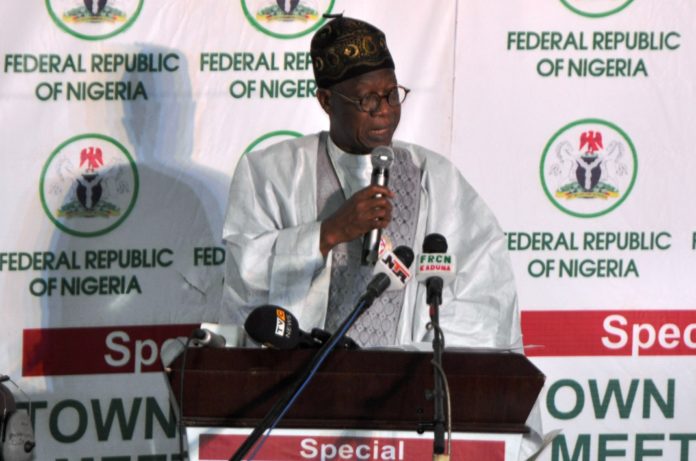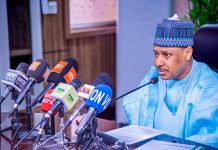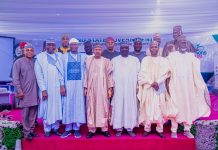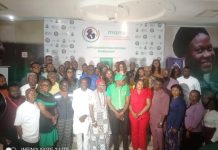OPENING SPEECH BY THE HONOURABLE MINISTER OF INFORMATION AND CULTURE, ALHAJI LAI MOHAMMED, AT THE SPECIAL TOWN HALL MEETING ON AGRICULTURE IN DUTSE, JIGAWA STATE, ON MONDAY, 12 NOV. 2018.
PROTOCOL
I welcome you all to this Special Town Hall Meeting on Agriculture, holding here in Dutse, Jigawa State. As I always do at our Town Hall Meetings, please permit me to most sincerely thank my colleagues, Honourable Ministers, for taking time off their busy schedule to be here. Without them, there will be no Town Hall Meetings.
2. May I also extend my special gratitude to His Excellency, Governor Muhammad Badaru Abubakar, and his entire cabinet, for the warm welcome and the hospitality that have been accord us and our entourage. More importantly, I thank His Excellency for all the arrangements that have been made to ensure the success of this Town Hall Meeting.
3. Finally, I want to thank all our guests, many of whom have travelled long distances to be here, as well as the gentlemen of the press, who have always ensured a good coverage of the Town Hall Meetings.
4. This Special Town Hall Meeting is dedicated to AGRICULTURE. It is the third in the series of the Special Town Hall Meetings which we will be organizing between now and the 2019 general elections to showcase the achievements of the Buhari Administration. The first edition of the Special Town Hall Meetings was held in Gusau, Zamfara State, on 10 Sept. 2018 to showcase the Administration’s achievement in the area of SECURITY, in particular the drastic reduction in the number of killings in certain parts of the country.
5 The second edition of the Special Town Hall Meetings was held in Ibadan, Oyo State, on 25th October 2018 and dedicated to showcasing the Administration’s giant strikes in the area of INFRASTRUCTURE. Overall, this is the 15 edition of the Town Hall Meetings which was launched by the Ministry of Information and Culture in Lagos on April 25th 2016.
6. The Town Hall Meetings have revolutionized the way the government communicates with the citizenry. In the first instance, it offers a two-way communication system: The government gets the platform to give account of its stewardship to the people, and the people get the opportunity to interrogate such stewardship and to also make necessary inputs in a no-holds-barred setting. Secondly, it eliminates the old practice in which the government only talks to the people, mostly through the media, when elections are coming. Thirdly, it enhances the participation of citizens in governance, thus deepening democracy.
7. Let me say here that the Town Hall Meeting is just one of many ways in which this government communicates with the people. There is the usual media interventions in the form of regularly press releases, radio and television appearances, newspaper interviews, Social Media interactions and the FGNiAPP that is downloadable on mobile devices. We will continue to broaden the lines of communication between the government and the governed.
8. There is no doubt that the Buhari Administration has made a giant stride in the area of Agriculture, which is widely regarded as one of the success stories of this Administration, as you will hear shortly from the Honourable Minister of Agriculture and Rural Development, who is the main resource person for today’s Town Hall Meeting, and also one of the panellists.
9. However, please permit me to alert Nigerians to the reality out there: In pursuing our agricultural revolution, which will ultimately lead to self sufficiency in the national staples, we should not expect accolades and support from outside, especially from countries that have hitherto been the main exporters of food items such as rice to Nigeria. Every nation pursues its national interest, and it is definitely not in their interest for Nigeria to produce what it consumes, because it means you will no longer import from such countries.
10. It is in that context that Nigerians should see the recent fake news that Nigeria imported 400,000 metric tonnes more than the quantity of rice imported in 2017. The report, quoting the 2018 United States Department of Agriculture World Markets and Trade Report, also posited that Nigeria’s local rice production is dropping. When the figures were challenged, they said it was based on the assumptions – unrealistic as they were – such as satellite mapping of farms, expected demand by politicians for election campaigns and expected losses from flooding.
11. Fortunately, the Central Bank of Nigeria (CBN) has debunked this report, saying the volume of rice importation into Nigeria (in metric tonnes) declined drastically in 2018. Figures obtained from India and Thailand, both dominant rice exporters to Nigeria, indicate that as at September, Thailand had so far exported about 5,161 metric tonnes of rice to Nigeria, while India sold only 426 MT as at July. Let’s recall that as at Sept 2015, rice importation from Thailand was 644,131 MT. But by Sept 2017, the importation had fallen to a mere 22,000 MT. That’s over 90% drop!
12. The reduction is due to concerted efforts by the Ministry of Agriculture and Rural Development and the interventions of the Central Bank of Nigeria. In fact, the CBN said it had not allocated any foreign exchange for the importation of rice this year. So those who claimed that Nigeria imported 400,000 MT of rice more this year have not been empirical.
13. The conspiracy to thwart Nigeria’s push toward self sufficiency in rice did not start today. In 2015, the government was put under undue pressure to import rice ostensibly to make up for a massive shortage, when in the real sense there was a glut of paddy rice produced locally.
14. Finally, Your Excellency, Honourable Ministers, distinguished ladies and gentlemen, the format for today’s Town Hall Meeting. As I said earlier, the Honourable Minister of Agriculture and Rural Development, the main resource person, will make a comprehensive presentation right after my opening comments. That will be followed by another presentation by a representative of the Governor of Central Bank of Nigeria, on the Anchor Borrowers’ Programme, and we will then proceed straight to the question and answer session. Please note that there is no, no-go areas as you ask your questions.
15. I thank you all for your kind attention. May I now call on the Honourable Minister of Agriculture and Rural Development to make his presentation.






